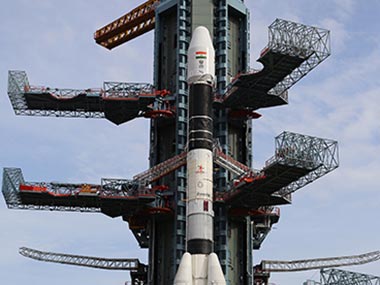 Chennai, Aug 18: 29-hour countdown began for the crucial launch of India"s GSLV-D5, powered by indigenous cryogenic upper stage engine — which is being tested after a failed attempt over three years ago — and carrying communication satellite GSAT-14, from Sriharikota spaceport.
Chennai, Aug 18: 29-hour countdown began for the crucial launch of India"s GSLV-D5, powered by indigenous cryogenic upper stage engine — which is being tested after a failed attempt over three years ago — and carrying communication satellite GSAT-14, from Sriharikota spaceport.
The rocket carrying the 1,982-kg satellite would be launched at 4.50 pm tomorrow from the second launchpad at Indian Space Research Organisation"s Satish Dhawan Space Centre in Sriharikota, about 90 kms from here, in Andhra Pradesh.
India needs cryogenic engines for GSLVs for carrying heavy payloads of up to five tonnes which are crucial for future telecommunication and space exploration as its current successful PSLVs can carry only payloads weighing up to 1.5 tonnes in geosynchronous transfer orbit.
“After the launch authorisatioin board gave its clearance, the 29-hour countdown started at 11.50 am. Everything is going on as per schedule,” ISRO officials said.
GSLV-D5, which will have a duration of 17 minutes and eight seconds, is the eighth flight of the Geosynchronous Satellite Launch Vehicle and the fourth developmental flight.
The mission assumes more significance as the indigenously developed cryogenic upper stage (CUS) will be flight tested for the second time by the Indian Space Research Organisation.
The previous flight test of the indigenous cryogenic stage in the GSLV-D3 mission failed on April 15, 2010.
Besides, the next GLSV flight with a Russian cryogenic stage also ended in failure in December 2010. GSAT-14 will help provide many satellite based communication services to the country including tele-education and telemedicine.
The main objectives of the GSAT-14 mission is to augment the in-orbit capacity of Extended C and Ku-band transponders and to provide a platform for new experiments.
The GSLV-D5 with a lift off mass of 414.75 tonne is 49.13 metre long and has three stages of separation. It would launch the GSAT-14 into Geosynchronous Transfer Orbit.





Comments
Add new comment